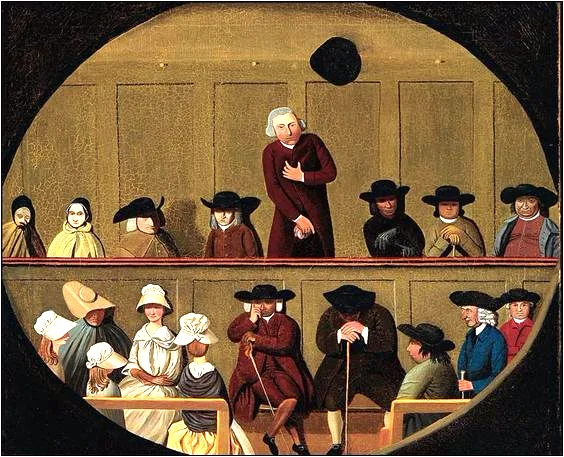
what is quakerism?
Resources available in Berkeley Friends Meeting Library
Quaker Speak video: What is a Quaker?
Quaker Speak videos: Quaker Basics- Videos for Beginners (includes What Do Quakers Believe, Why I am a Quaker, 9 Core Quaker Beliefs, the Difference Between Quaker Meeting and Other Services, and others)
Led by founder George Fox, Quakerism developed in England during a period of social upheaval in the mid-1600s that produced many new Christian religious sects. Seekers, as Quakers were then called, were persecuted against because they believed that people could directly relate to and communicate with God-- without the need for priests or preachers. Today, Friends are called the Religious Society of Friends, just Friends, or Quakers.
There are different groups of Quakers today, some who have ministers and some who do not (Berkeley Friends Meeting is one of these "unprogrammed" Meetings) but there are some core beliefs:
There is "that of God" in each individual, leading Friends to believe every person is worthwhile.
God can be known by any individual through a process of silent waiting and discernment.
The existence of continuing revelation from God and the belief that each individual has the ability to discern the will of God.
Other beliefs are laid out in the Pacific Yearly Meeting Faith and Practice (Webpage / pdf ). Note: other Yearly Meetings (regional groups of Friends) have their own version.
In Pacific Yearly Meeting, we refer to Friends Testimonies (SPICE):
Simplicity
Peace
Integrity
Community
Equality
Harmony with Nature
The authors of Quaker Maps state, "Quakerism arises out of a radical interpretation of Christianity that understands Christ as being a living reality in personal experience, not only in the Bible and Church tradition. The basic discovery of the Friends movement is - in the words of George Fox, the movement's founder - that 'Christ is come to teach his people himself'". From Quakerism 101 / A Brief Introduction to Quakerism (http://www.quakermaps.com/info)
The belief that each individual has the ability to discern the will of God led to the continuing practice of unprogrammed Friends Meetings to worship without a minister or preacher. Instead, Friends meet and gather together in communal, silent waiting for the Word of God to be discerned by individuals.
These Meetings for Worship are typically one hour in length and are characterized by the communal gathering together in silence, sometimes for the entire period, messages brought by individuals after they have discerned whether they are from Spirit and are meant for the gathering. After each message, Friends wait to process before others speak. After an appropriate period, the Meeting Clerk or member of the Ministry and Care Committee calls for the rise of Meeting and the Meeting for Worship is over.
The belief that there is "that of God in everyone" also leads to a different process for conducting business. Friends do not vote on items of business but instead, work towards unity on communal solutions. Unless unity can be found-- often seeking guidance from God-- no action is taken by the Friends Meeting.
Over the centuries, the belief that there is God within each individual led Quakers to seek peaceful relations with native Indians when they first came to American colonies, and to the forefront of the abolition movements to abolish slavery, prison reform, and to women's suffrage and rights. The Religious Society of Friends is also one of the traditional "peace" churches and members do not believe in guns or killing or going to war.
Sources of additional information:
A Brief Introduction to Quakerism (Quaker Maps)
What are Quaker Beliefs? (from Friends General Conference)
What Happens in Quaker Worship? (from Friends General Conference)
What are Quaker Testimonies (Engaging with the World)? (from Friends General Conference)
How do Quakers live today? (from Friends General Conference)
What is the history of Quakers? (from Friends General Conference)